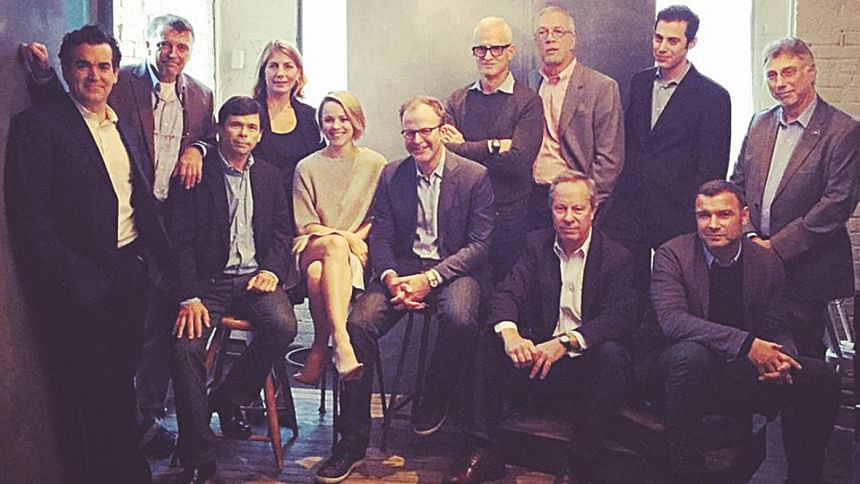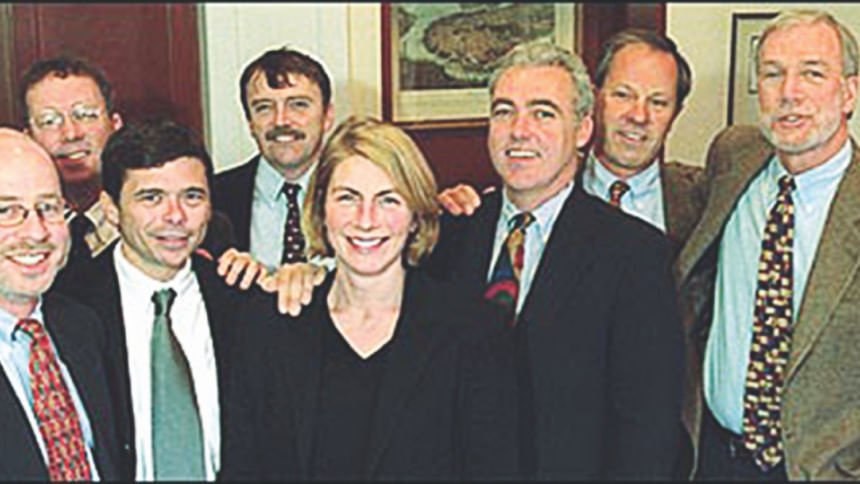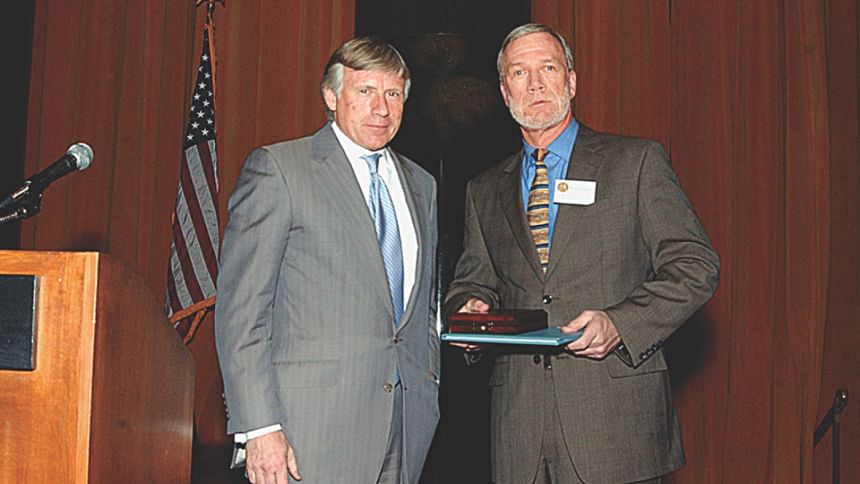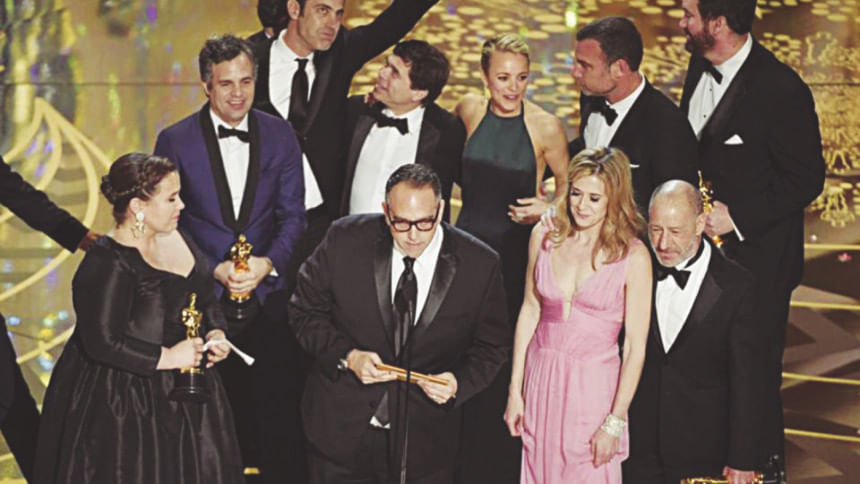Spotlight for victims

This is the beginning of the Hollywood film – Spotlight -- that won the Oscar as the best picture of 2015. To win the Oscar, it had to beat The Revenant, an exciting movie based on the story of Hugh Glass (1783—1833), an American frontiersman and fur trapper who has become a folk hero after surviving a bear attack and then travelling hundreds of miles alone to safety. It won two of the biggest Oscars -- for best actor and best director. Titanic sensation Leonardo DiCaprio won his first Oscar as best actor in The Revenant. And it was almost certain that The Revenant would win Oscar as the best film of 2015.
In terms of the budget and income, Spotlight lagged far behind. The budget for The Revenant was $135 million and it earned $533 million. In contrast, the budget of Spotlight was only $20 million and it earned $88.3 million, according to Wikipedia.
But Spotlight proved all speculations wrong. What is the secret and strength of Spotlight? In 129 minutes, the film tells about a true story of how The Boston Globe uncovered the massive scandal of child molestation and cover-up within the local Catholic Archdiocese. The revelation has shaken the entire Catholic Church to its core. Members of The Boston Globe's Spotlight Team won the prestigious Pulitzer Prize for Public Service in 2003. The newspaper was honoured, according to the Pulitzer website, "for its courageous, comprehensive coverage ... an effort that pierced secrecy, stirred local, national and international reaction and produced changes in the Roman Catholic Church."

HOW SCANDAL UNCOVERED
Marty Baron joined The Boston Globe in 2001 from The Miami Herald. In his debut editorial meeting at the Globe, as the Spotlight shows, Baron expressed his frustration at the newspaper's investigation team -- Spotlight -- a small group of journalists. He questioned why Spotlight hadn't tried to secure the release of court documents about an abusive Catholic priest he had read about in a minor article. He knew about it after going through a Globe column about a lawyer, Mitchell Garabedian, who said Cardinal Bernard Law (the Archbishop of Boston) knew that priest John Geoghan was sexually abusing children and did nothing to stop him. Baron asked the Spotlight team to investigate it. He also learnt there was a lawsuit against the priest. And the judge had sealed the court records to prevent it from going public. But Baron was hell-bent to dig deeper and discover the truth though the Spotlight Team was initially reluctant to go ahead with the idea. The team members felt it would risk alienating their readers in Catholic-dominated Boston.
But Baron did not pay heed. He assigned them to investigate allegations against John Geoghan, an unfrocked priest accused of molesting more than 80 boys. Led by Walter "Robby" Robinson, the Spotlight Team made it their mission to provide proof of a cover-up of sexual abuse within the Church.
The Daily Star Correspondents have talked Robinson, the then editor of Spotlight Team, recently during a conference of investigative journalism in Kathmandu, Nepal. He was the keynote speaker of the conference. Talking to The Daily Star and in his speech, he shared his experience.
"Like a lot of stories, we started with one little secret and then we started to ask everybody who know anything about sexual abuse of children," said Robinson. "We quickly discovered a number of priests who were allegedly involved in molestation of children. Then we started to track to the victims of the priests and then we realised that it might be much bigger number. "

Robison, who is now editor at large of The Boston Globe, said they have created a database of such priests.
It was a Herculean task for the Spotlight Team. To report the cover-up, they spent an enormous amount of time with the victims -- “people who were suffering, vulnerable, hurt.”
“I can't say enough about the courage of the survivors in their willingness to help us,” Robinson said. “They saw what we saw: It was the only way for this to come to an end.”
Through their research, the team developed a list of 87 names, and began to find their victims to back up their suspicions.
After the September 11 attack, the team was forced to deprioritize the story. The Spotlight team regained momentum when one of its members learnt that there were publicly available documents that confirm Cardinal Law was made aware of the problem and he ignored it. Although the team member argued vociferously to run the story immediately before more victims suffer and rival newspapers published it, Robinson remained steadfast to research further so that the systemic problem can be fully exposed. Meantime, The Boston Globe won a case to have even more legal documents unsealed.
"We worked for five months to get to the first story. Then once we started to publish, we published 600 stories in first year in 2002. Soon the story broke, we added four reporters to our original four-member team, so there were eight reporters. Then we worked on the stories fulltime until 2003. So, in the end we did about 900 stories on the sexual scandal," said Robinson.
In Boston, church always holds some power. Asked if Spotlight Team faced any political pressure before or after publishing their reports, Robinson said: "Yes. You know many wealthy and influential Catholics who were friends of the cardinal and as we started to talk to people, many of them said 'why are you doing this to the church?' People challenged this why you are doing against the church. But they had no idea. They did not know how bad it was. Once they knew then their perceptions changed."
"When we started interviewing the victims we became very angry once we heard what happened to them. So nothing was going to stop us from finishing stories."

Neither the church nor any followers of the church dared to file any defamation case against The Boston Globe for the series of reports, exposing the scandal in the religious place.
"We had the Church's own documents. The documents proved what had happened. And we did not use anonymous sources," he said about the strength of his Spotlight Team.
To dig out the scandal, Robinson remembered leadership of his editor Marty Baron, who later become the editor of the Washington Post.
"He [Baron] asked us to work on one priest. He was a new editor. He just arrived. He knew about the allegation of child abuse. He wanted to know why we had not worked into this. Nobody had got to do that. So that is what we did. He was a courageous man."
The coverage of The Boston Globe triggered a public outrage.
Criminal charges were brought in 2002 against five Roman Catholic priests in Boston (John Geoghan, John Hanlon, Paul Shanley, Robert V. Gale and Jesuit priest James Talbot) which ultimately resulted in the conviction and sentencing of each to prison. The coverage of these cases by The Boston Globe thrust the issue of "sexual abuse of minors by Catholic priests" into the national limelight. The coverage of these cases encouraged other victims to come forward with their allegations of abuse resulting in more lawsuits and criminal cases.
The New Yorker in a report on December 8, 2015, said Cardinal Bernard Law resigned in 2002 as archbishop of Boston, after a storm of public outrage. Powerful Catholic charities and laypeople sided with him; 58 priests signed a letter demanding that he quit. (The Vatican then gave him a distinguished position in Rome; he is now retired.)
In 2014, the Vatican said that it had defrocked 848 priests worldwide for sexual abuse between 2004 and 2013, and that 2,572 clerics had been disciplined for abuse violations, according to “Betrayal,” the Globe's book about the scandal.
Policies have changed and priests have been punished, but bishops, for the most part, have not, said the New Yorker in the report styled "Spotlight and its revelations".
A VOICE TO SURVIVORS
After more than a decade, Tom McCarthy, director of the Spotlight film, has come with the idea to make a film on child abuse case. Robinson said they had trouble imagining why anybody would want to make film about reporting. "The film however makes our work exciting. We feel very gratified as the film helped many more victims come forward. It caused a lot of people to realise how important the investigating reporting is. Not just in US, but other countries as well and even the most difficult stories you can get, not just in US, but anywhere."
The Boston Globe appeared in spotlight again as the film Spotlight won the Oscar. In addition, the writing team of Josh Singer and director Tom McCarthy won the Oscar for best original screenplay.
“This film gave a voice to survivors and this Oscar amplifies that voice, which we hope will become a choir that will resonate all the way to the Vatican,” said film producer Michael Sugar while accepting the award.
While accepting the best original screenplay Oscar for “Spotlight,” McCarthy said: “We made this for all the journalists who have and continue to hold the powerful accountable and for the survivors, whose courage and will to overcome is really an inspiration to us all. We have to make sure this never happens again.”

 For all latest news, follow The Daily Star's Google News channel.
For all latest news, follow The Daily Star's Google News channel. 



Comments